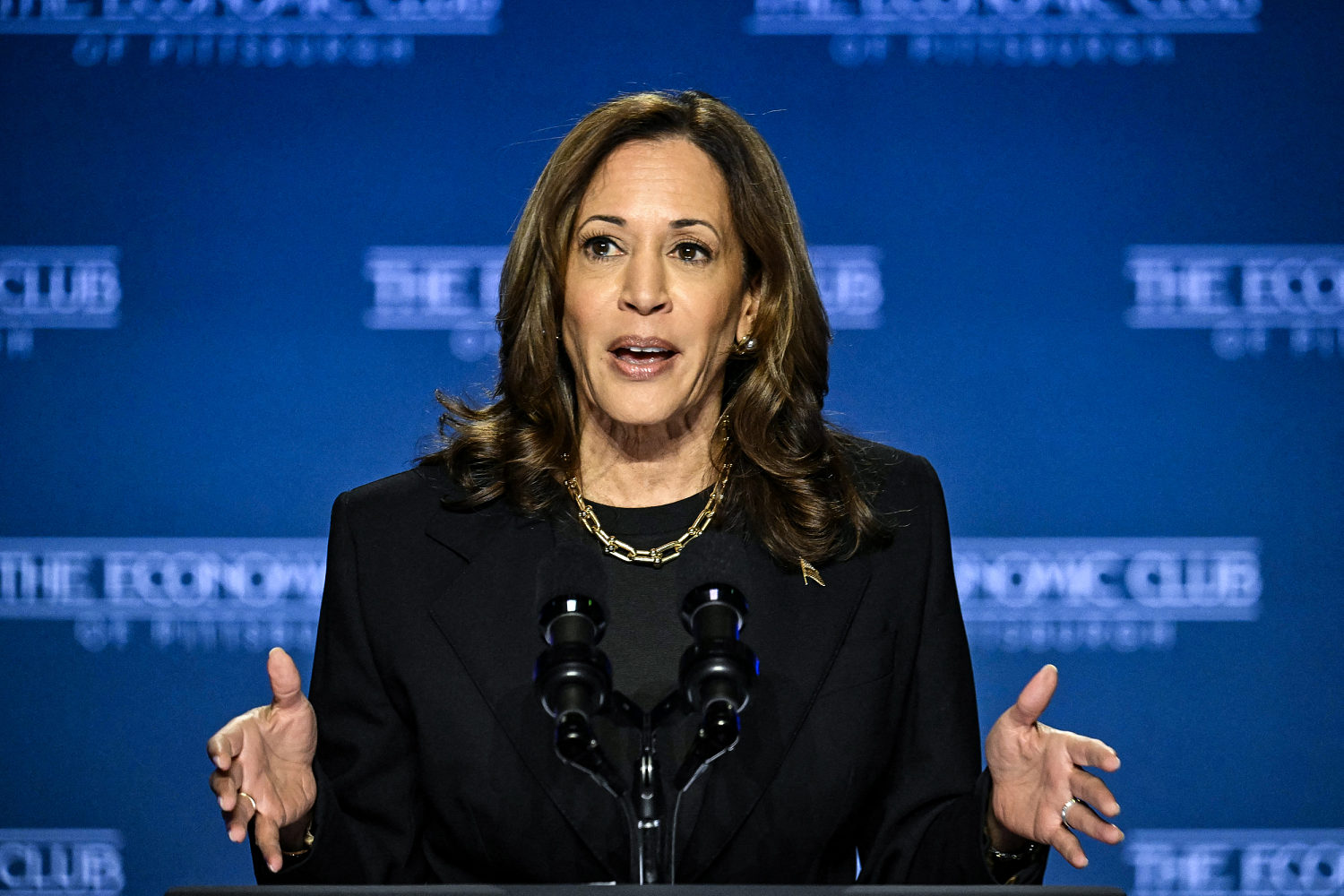
PITTSBURGH — Kamala Harris vowed to govern as a pragmatist who won’t be captive to ideology in an economic speech Wednesday while outlining some $100 billion in new investments in manufacturing, a major issue in this battleground state.
Harris proposed an “America Forward” agenda that calls for tax credits to boost investment and industrial job creation, along with investments in artificial intelligence, science and energy development, as well as supporting American-made products.
“This plan will cost approximately $100 billion and will be paid for by a portion of the proceeds of international tax reform, which seeks to prevent a global race to the bottom and to discourage inversions, outsourcing, or international tax strategies designed by corporations to avoid paying their fair share to the United States,” the Harris campaign said in a fact sheet.
Harris also called for cutting red tape to build in the U.S., and endorsed nixing “unnecessary” college degree requirements for various federal jobs, mirroring a policy that Pennsylvania Gov. Josh Shapiro enacted in this battleground state.
“I promise you I will be pragmatic in my approach,” Harris told a tightly packed crowd here. “Because I believe we shouldn’t be constrained by ideology and should instead seek practical solutions to problems.”
“I’m a capitalist. I believe in free and fair markets,” she said.
The Democratic vice president, who is battling criticism for being light on various policy issues, sought to claim the mantle of the middle-class candidate while portraying Republican rival Donald Trump as the candidate of the billionaire class. The speech was light on new policy details and heavy on framing the broad contrast she’s seeking to drive.
“Donald Trump has no intention of lowering costs for the middle class. In fact, his economic agenda would actually raise prices,” she said, citing nonpartisan economists who have examined Trump’s plan for aggressive tariffs.
The speech marks an attempt by Harris to neutralize Trump’s advantage on who would best handle the economy and address the cost of living, which consistently rank as top issues for voters. Her campaign has already made inroads with voters about handling the economy, slashing Trump’s 22-point lead over Joe Biden in January to a 9-point lead over Harris in a new NBC News poll. For undecided voters in battleground states like Pennsylvania, it could be crucial.
Pennsylvania voters react to Harris’ speech
Economic concerns have been a liability for Democrats throughout the 2024 campaign cycle, as the post-pandemic global economy saw inflation rise. Republicans tried to pin responsibility domestically on Democrats, arguing it was fueled by the large spending bills President Joe Biden signed into law. And while domestic economic policies can have reverberating impacts, the supply chains that caused higher prices are, at least in part, beholden to global economic conditions.
Before he dropped out of the race in July, Biden tried to embrace ownership of the economy, a bet that conditions would improve by Election Day and that voters would reward him for his record. Harris has offered a different message, saying she recognizes there’s still too much economic pain and focused her new planks on relieving the pressure of high costs for the middle class. Overall, Harris hasn’t departed dramatically from Biden on policy.
Trump has sought to paint his economic policies as solutions to Democratic woes, focusing heavily on tax cuts and tariffs as a panacea, while making lofty promises about slashing energy costs. He has struggled when asked to get specific about how he would bring down costs and deal with issues like child care.
Trump has also sought to define Harris not by the moderate positions of her 2024 campaign but by the left-leaning stances of her failed bid for the 2020 Democratic nomination.
Voters who attended Harris’ speech expressed confusion that other Americans see Trump as good for the economy.
“I don’t understand how you can trust someone who repeatedly lies,” said Angela Garcia, who lives in the suburbs of Pittsburgh and watched the speech in person Wednesday.
Susan Bails of Pittsburgh, who is retired, noted that inflation is “a global phenomenon” due to the pandemic, one that has hurt her too, being on a fixed income.
“I’m really scratching my head at why anybody is thinking Republicans are good on the economy,” Bails said, adding that the last few GOP presidents — Trump and George W. Bush — expanded the deficit and left the economy in ruins.
Denise Meyers, a 74-year-old Harris supporter who attended the speech, cited Trump’s anti-union record to argue he’s bad for the middle class. “I do not think, with all of his bankruptcies, that he’s good for the American economy,” Meyers added. “I feel he’s out of touch. Born with a silver spoon in his mouth.”
As for Harris, Meyers said, “I think she has good economic ideas to grow and help the middle class.”
Harris touted her plans for expanding the child tax credit, tackling prices for housing, food, and prescription drugs, and expanding tax breaks for small businesses. She also said she would “invest in our industrial strength” and counter China’s global strength. She said that includes propping up factory towns — many in this area have suffered economically in recent decades.
She said she would work with Congress and businesses to “reform permitting” and cut red tape in order to boost job creation.
“My opponent Donald Trump makes big promises on manufacturing,” she said. “On Trump’s watch offshoring went up and manufacturing jobs went down across our country… He constantly got played by China.”



